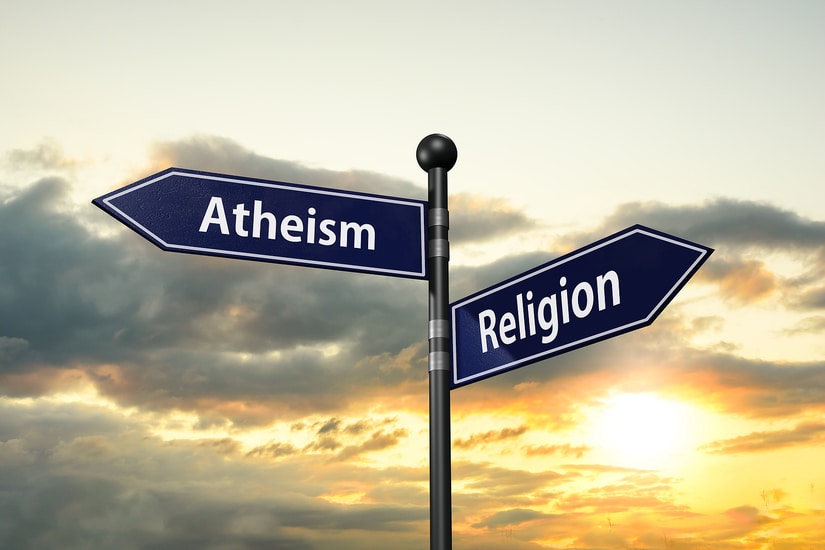Towards Smarter Atheism
Towards Smarter Atheism: An article by a Muslim writer expressing his view of atheism. Dik al-Jinn wrote:
Amidst millions of assumptions that people argue about their validity day and night, two facts emerge as clear as the sun, and no human, not even an animal, can deny them, namely birth and death, creation and annihilation, about these two established truths that even road dogs and cockroaches believe in Fields, mankind posed three great existential questions.
The first question was, How did creation begin? Who started this reproductive sequence that we see today? How did it all start?
The second question is, what happens after death? How will this all end? Or will it remain without end?
The third question was why? What is the wisdom of all this? And what is the role that we as human beings are required to play?
Of course, it is self-evident to say that a person can’t come up with a satisfactory answer to these questions, and the reason is simply that they occurred outside his time domain, that is, we did not witness the beginning of the universe to know who created it, and no one has returned from death to tell whether there is life after death or not. However, there were many guesses. The Greeks, for example, believed in multiple gods that control natural phenomena such as thunder, rain, and so on.
As for the Egyptians, they linked religion to astronomy, and there was a servant of the sun and there was a servant of the animal, and there were those who truly believed that this universe was carried on the back of an elephant or a bull’s horn.

For us in our Arab region, on one day in the year 611 AD, a man from the Quraysh tribe named Muhammad bin Abdullah came out to the people, claiming that he had convincing answers to the three questions, so he said that he who created the entire universe is a God who has the qualities of perfection. One soul and her husband were created from her, and that the fate of all people after their death until the day when everyone is raised to hold each person accountable for his deeds, and that the wisdom or the human role required is the righteous deed, that is, in short, his answers were creation, death and another day in which the fate of man governs his previous work in this world.
Of course, Muhammad bin Abdullah did not say that this explanatory model for the world came from his brainchild but simply said that it was sent by the Creator of this universe itself and that the mediator between them is a luminous being named Gabriel who works with this god and transmits to Muhammad well-crafted Arabic sentences that Muhammad said about They are verses from the Holy Qur’an that represent the word of God, and even though no one witnessed this Gabriel, several people began to adopt the answers presented by Muhammad, and it seemed to them very convincing.
This explanatory model for the world as presented by Muhammad, and later known as Islam, was the only thing that Muhammad’s call revolved around for thirteen years, thirteen years in which Muhammad did not say anything to anyone else, there was no ritual of Islam that we know. Today, there is no prayer, no zakat, no fasting, no Hajj, inheritance, or anything else… All that Muhammad required people to believe only in the interpretation that he brought, created, resurrected, and good deeds, so that all the verses of the Qur’an that were revealed during that period were discussed The same thing, and it usually begins with a sentence, (O people).
The conclusion is that in verses of people who believed in Muhammad’s answers, there are people who rejected them, and they were not convinced of what he said, or some of what he said. Some, for example, agreed with Muhammad that this god whom you say about him created the earth and man. (And if you asked them who created the heavens and the earth to say, God) but they rejected the idea of resurrection and ridiculed the idea of life after death (it is nothing but our worldly life, we die and we live and we are not envoys). But in any case, they did not discuss anything else with Muhammad, they just rejected his basic thesis.
After a period of faith in a certain number of people in Muhammad’s thesis on creation, resurrection, and righteous deeds, Quraysh found that these people multiplied and that Muhammad began to pose a real threat to them, so they decided to kill him, so what was only for him was that he took his companions and migrated from Mecca to Medina, to begin the detailed phase in Islam, Or in the thesis let’s say …
In Medina, Muhammad began to detail and clarify to his companions (the believers in him here) the third part of his thesis. The righteous deed .. Then all the verses of the Qur’an came detailing and accurate about life matters that they live daily, and most of those verses began with a sentence, O you who believe. He forbade usury, eating orphan’s money, stealing, and urging zakat, charity, etc., then he talked about the relationship of women with men, separating marriage, divorce, decency, turning a blind eye, etc. .. Then he also spoke in detail about morals that should be adorned, so he forbade envy, jealousy, gossip, backbiting, espionage, obscene speech, and order justice and charity And family kinship, and of course setting laws related to punishments such as murder, wounds, and adultery, as well as enacting inheritance and prohibiting alcohol and pork and imposing individual rituals such as prayer, fasting, and Hajj.
In short, the civil stage was a stage of elaboration and clarification of the idea of the righteous deed that the early Companions were striving in, governed by their strong internal strife without specific texts, and these clarifications continued, supported by verses until Muhammad Bin Abdullah was died, with his death, it can be said that his project was completed.
In light of the above, we can now comprehend several things, the first of which is that Islam is not based on appearances that appear to be its main pillars, such as prayer, beard, veil, etc., these are really important matters, but they are just details of the idea of good deeds. Islam is basically – and as it should be taught to children – and establishes In minds and explains to people, it is an explanatory model for the world .. Muslims were convinced – mentally – through the words of their Prophet Muhammad, so the question is: Is there any concrete evidence of the truthfulness of those answers that Muhammad provided? The answer is simply: No. No concrete evidence or test tubes is indicating the validity of these answers, because as we previously said that these matters from the beginning of creation and the end of life are matters outside the scope of man’s temporal sphere, but it is a mental belief, a belief in the unseen, which is the description The first for Muslims in the Qur’an, “they believe in the unseen.”
And because it is a metaphysical faith, it is unreasonable for a person to come to demean the value of reason in Islam because the mind was the main tool through which people were talked at the beginning of the matter, and with which they were addressed until now, and because it is also a metaphysical faith, it is not logical for anything to force people to Or, to have their heads cut off if they reject it. Whoever wants to be convinced of this model, let him be convinced, and whoever does not convince it, he is what he wanted.
The second thing that can be deduced from this proposition is that the saying that religion opposes humanity is an invalid and funny saying, because one of the three pillars of Islam and the Muslim’s contract with God to enter Paradise is righteous deeds, that is, good dealing with people and animals or what is known today as humanity, and this is exactly what The companions of Muhammad understood it at the beginning of Islam, and even before anything was imposed on them, but rather that a number of them died during that period and Muhammad testified to them in Paradise without praying one rak’ah or fasting during the day, like his wife Khadija and the family of Yasser and others, so what is Paradise obligatory for them except with deep faith and good Creation? It is good to speak here, that Al-Fatiha, which is the basic surah in which the prayer can only be performed, had not yet been revealed, and it was only revealed after the migration.
As for the third and most important thing, it is that I – honestly – ask atheists to have a kind of intelligence equal to at least the intelligence of the infidels of Quraish, it is very ridiculous to come and say that I reject Islam because the Messenger married ten women or because Islam imposes the veil or cuts off the hand of the thief,
That is, Islam, my dear atheist – for the tenth time – is an explanatory model for the indisputable realities of the universe. If you have another compelling explanatory model that explains death and life and what is in between, say it and I will be the author of these words the first to follow you, but if you do not believe in what he believes With people, and at the same time you have no alternative, why should they hurt their heads and provoke their feelings day and night? Why criticize the details of their religion that are supposed to not concern you? Can’t you be at the level of the infidels of the Quraish who rejected the original thesis from the original, and based their enjoyment and life in complete harmony with what they believe ??
In other words, if the verses of “O people” do not convince you, then do not dispute the verses of “O you who believe.” These are not written for you and do not concern you.
World Religions
Read also:
Religiosity and intelligence | Atheists are smarter than believers according to science
Believe In God | 9 Reasons People Don’t Believe In God
What is Islam religion | History, Facts, Beliefs, Symbol..
Agnostic religion | History, Beliefs, & Definition &More
Types of religion around the world and throughout history



